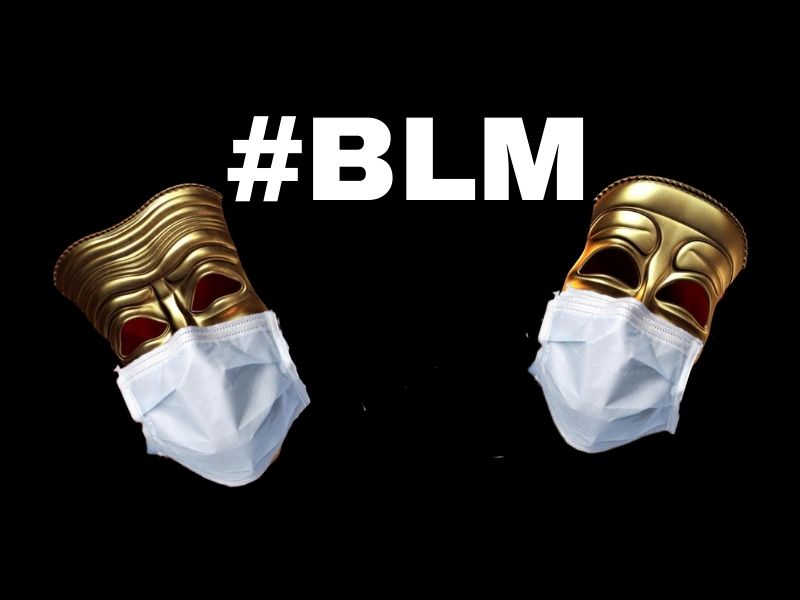Shugoll Research, a national marketing research company in Bethesda, Maryland, has released findings from a Wave 2 online survey it conducted with 743 DC-area theatergoers about three pressing areas of concern: their intent to return to the theater when it reopens after the coronavirus pandemic, their engagement with online content, and their views on systemic racism in area theaters. The results on all counts have far-reaching implications.

SEE the Shugoll Research Wave 1 report, from mid-April 2020: “When theaters reopen, will DMV audiences return? Survey says it’s iffy.”
Theatergoers are more hesitant to return to the theater today than previously
Three months after the initial analysis that showed theatergoers will trickle back to area theaters, DC theatergoers are even more hesitant today to return when theaters reopen. Theaters must develop budgets reflecting this slow return. This is based on the following findings:
- Only 16% will attend right away whenever theaters reopen vs. 25% in wave 1. Now 75% will wait at least a few months before returning (vs. 49% previously) and 39% will wait 6 months or more (vs. 14% previously).
- Few theatergoers say they are very likely to attend theaters if they open at any time this year (9% if they open in July-August, 15% September-October, 22% November-December). Even after the first of the year through early spring, fewer than half of theatergoers are very likely to attend (32% January-February, 43% March-April). The earliest date the majority of theatergoers say they will very likely attend is next May-June (55%). The percentage increases to 64% in July-August, 2021 and is still below three-quarters the following fall (72% September 2021 or later).
“This is not good news for theaters hoping to begin generating much needed earned income as soon as possible,” says study author Mark Shugoll, Ph.D. “Some theaters are better positioned than others to survive this setback of audiences taking a wait and see attitude about returning.”
Intent to attend is low for all sizes of theaters, from the largest like the Kennedy Center (17%) to the smallest with fewer than 125 seats (20%). There is a little more willingness to attend theaters for family and youth (28% among those who have attended these in the past) and even more in attending theater outdoors (40%)—good news for institutions thinking about this, but still less than a majority of theatergoers.
DC theatergoers who have been to Broadway shows in New York in the last year are as unlikely to schedule a future trip there as to attend local theaters. This is a big change from the last survey wave. Only 19% who have gone to Broadway shows in the past year are very likely to attend when they reopen, down significantly from 30% last wave.
Sports teams will face similar challenges as theaters. The study finds that only 15% of the sample is very likely to return to attend indoor arenas like Capital One Arena once they reopen to fans and 28% to outdoor stadiums like Nationals Park and FedEx Field. These are also down significantly from Wave 1.
Once theaters reopen, they likely will see a net audience decline from previous seasons before the pandemic, much more significantly than suggested in Wave 1. Many more (59%) say they plan to attend theater less in the future compared to Wave 1 (27%). Forty percent say they will attend somewhat less and 19% much less. Therefore, not only will audiences be slow to come back; they will exercise their theater habit considerably less often, resulting in a downsizing of audiences.
Lack of a COVID-19 vaccine significantly impacts willingness to return to the theater
A major reason theatergoers will be slow to return to any type of theater is that a significant number will wait until there is a COVID-19 vaccine. A total of 40% of all theatergoers, and 53% of a key theater demographic (those age 65+), say they are very unlikely to attend the theater until there is a vaccine.
Online content has engaged audiences but may not be a significant source of future income
Two-thirds of theatergoers (66%) have watched online programming from theaters during the pandemic, suggesting this is a good way to stay engaged with audiences. However, few watch content frequently (3% daily, 8% a few times a week). They are more likely to watch a few times a month (20%), once a month (13%) or less than once a month (22%). About a third have never watched (32%).
Only a quarter of all theatergoers (25%) say they are very likely to pay for online content in the future including full recordings of plays, concerts, films, and interviews with artists, even if they thought the price was reasonable. This will generate some income for theaters, but the income seems limited, perhaps because it is hard to make the transition from consuming free content, as primarily offered so far, to paid content.
Most theatergoers feel theaters must respond to charges of institutional racism and improve equality for Black and Brown artists and staff
Almost 4 in 10 theatergoers (38%) highly agree that there is systemic racism in DC-area theaters, which impacts hiring and the type of work seen on stage. Another 12% somewhat agree, making a net of 50% agreeing. “These are significant numbers and make a strong statement about perceptions of area theaters by their attenders,” says study author Shugoll.

More than 6 in 10 African Americans (61%) highly agree that there is systemic racism in area theaters. About three-quarters (72%) at least somewhat agree. Among whites, the percentage strongly agreeing drops to a much smaller but still significant percentage (29%). Theaters that commit to overcoming racial inequality must educate their white audiences on the extent of the problem and the challenge ahead to secure their support in their effort.
Creating a more diverse theater structure is very important to area theatergoers regardless of whether they believe there is systemic racism. Seven in ten (70%), regardless of race, strongly support the idea that area theaters must respond to the concerns expressed by Black and Brown artists that have come out of the Black Lives Matter movement. The same percentage (70%) strongly feel theaters must take specific steps to fight racism through actionable change in their industry and beyond. Almost two-thirds (64%) strongly agree it is important that area theaters more greatly reflect racial diversity in all ways than they do now.
Methodology and Additional Information

This study was conducted using Shugoll Research’s proprietary panel. A total of 743 surveys were completed between June 25 and 30, 2020. Data are accurate within +/- 4% at a 95% confidence level. Participants were required to attend at least two professional theater productions in a typical year, at least one of which must be at a theater other than those that primarily present touring companies (Kennedy Center, National Theatre, Warner Theatre). A copy of the Full Report or the Executive Summary can be downloaded here.
RELATED SURVEYS, from mid-May 2020:

“Many theatergoers in no hurry to go back to Broadway, new survey finds”

“When shows go on again, audiences across America will be slow to show up, says new survey”




